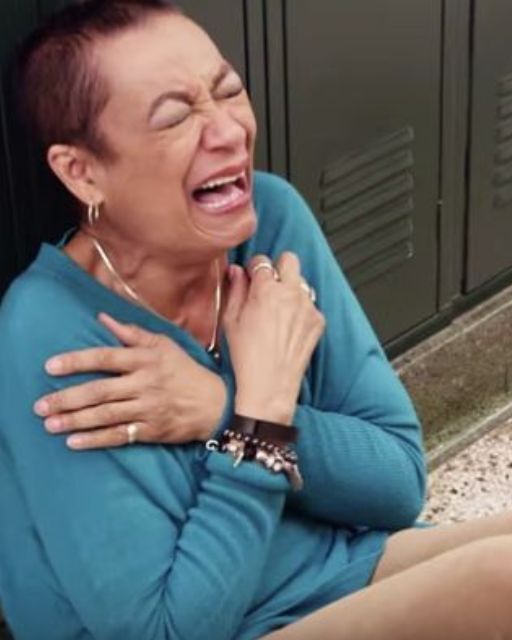She had expected a quick visit—just a simple stop to sign some paperwork. The secretary’s voice over the phone had sounded casual and reassuring: “Come by after lunch, it won’t take long.” But the moment she stepped into the school hallway, everything shifted.
It had been months since she last set foot in the building. The grueling cancer treatments had drained her strength and spirit. Walking through those once-familiar corridors, this time as a visitor rather than a teacher, stirred a deep ache inside her. For a moment, she almost turned away. But something—a quiet voice inside, perhaps—urged her onward.
As she rounded the final corner, she came to an abrupt halt.
The hallway was lined with dozens of her former students, spanning several generations. Some wore college sweatshirts, others cradled toddlers on their hips. They stood closely together, holding flowers, handmade signs, and tears.
Across the lockers stretched a large banner that read: “Welcome Home, Ms. Carter.”
One student had painstakingly recreated her old classroom bulletin board, filled with the inspirational quotes she used to share. Another handed her a steaming cup of lavender tea—her favorite comfort. Then, softly, a familiar melody drifted through the air. A former theater student, now studying music, began to sing a song they had performed together in a school play years ago. Gradually, more voices joined in, filling the hallway with music, memories, and heartfelt emotion.
She sank to the floor—not from weakness, but overwhelmed by the tide of love and gratitude surrounding her.
These weren’t just faces from her past—they were lives she had touched, young souls she had helped shape. Faces she had seen struggle and grow, now returning to remind her she hadn’t been forgotten.
Jessie, a student she’d once stayed late to help after class, knelt beside her. The girl who had struggled to pass English was now standing tall and confident, offering a bouquet of wildflowers. “You didn’t just teach us English,” Jessie said softly. “You taught us how to believe in ourselves.”
Tears streamed down Ms. Carter’s cheeks. “I never expected this,” she whispered.
Jessie smiled warmly. “You taught us to show up. Today, we’re showing up for you.”
As more students shared stories and thanks, Ms. Carter felt something deeper than happiness—it was a profound sense of validation. Years of pouring her heart into teaching, often without recognition, were finally rewarded in the most beautiful way.
Tom, the quiet boy who had always struggled with math and doubted himself, stepped forward next. Now wearing a college hoodie, he stood proud and confident. “You never let me give up,” he said. “Thanks to you, I’ll be the first in my family to graduate.”
Then Sarah spoke. She had once come to Ms. Carter in a moment of crisis when home life became unbearable. Now a nurse with bright, determined eyes, she said, “You taught me how to care—truly care. You helped me find my voice.”
Their words echoed through the hallway, and Ms. Carter realized this was the true legacy of her work—not test scores or grades, but the lives she had changed.
Then, from the edge of the crowd, the school principal stepped forward, his expression grave. “It’s wonderful to see you again,” he said, “but there’s something important we need to discuss.”
The hallway grew silent.
“There’s been a decision by the school board,” he continued. “Due to budget cuts, funding for some programs—including the English department—will be eliminated.”
The news hit her like a punch. Just as the love from her students wrapped around her like a warm embrace, reality threatened to unravel it all.
But her students did not hesitate.
Tom stepped forward once more. “You taught us to stand up for what’s right,” he declared. “We won’t let this happen.”
Sarah added, “You gave us strength. Now it’s our turn to fight.”
One by one, students voiced their determination. They launched petitions, wrote letters, organized meetings. Their collective passion sparked a wave of support throughout the community.
And they succeeded.
The board reversed its decision. The English department was saved. Ms. Carter’s work—and the future of the students she inspired—remained secure.
In the end, this wasn’t just a story about a teacher returning to the halls she once called home. It was about what happens when someone dedicates their life to others—and those people rise to stand beside her when she needs it most.
Ms. Carter didn’t just teach English. She taught resilience, compassion, and the power of showing up.
And her students? They learned those lessons well.
